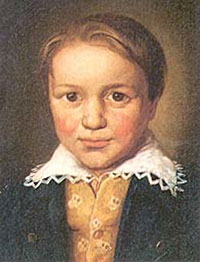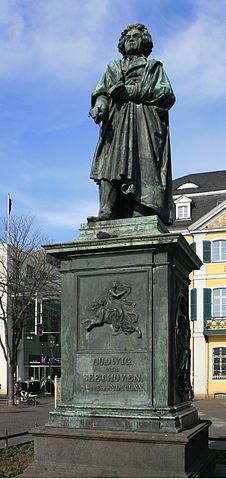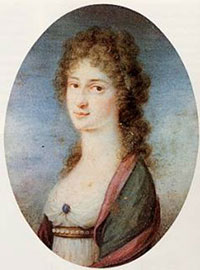
The Life & Legacy of Ludwig van Beethoven
An in-depth exploration of the iconic composer's upbringing, musical career and personal life.
If the remains of a medieval fortress wall encircling Beethoven’s home town of Bonn, close by the border with France, represented a psychological barrier to be transcended, so, too, did the Beethoven family’s penurious dependence on the city’s ecclesiastical prince, the Archbishop and Holy Roman Empire Elector.
Ludwig van Beethoven would live to break both those bonds. His compositions would become a cornerstone of Western music. Yet he would live to hear his late masterworks not with his ears but only, through a void of total deafness, in his imagination.
Young Ludwig

Young Ludwig learnt music from his father, Johann, a tenor in the service of the Electoral court, whose own father, also a singer, had been the Elector’s Kapellmeister or music-director. Ludwig’s first important teacher was the kindly court organist, Christian Gottlieb Neefe, to whom he became assistant orchestral harpsichordist (unpaid) at age 13. Already, probably at Neefe’s instigation, the musical press had hailed him as a ‘youthful genius’ in the mould of the young Mozart
The Elector, Maximilian Franz, son of Maria Theresia and brother of Marie Antoinette, also a devoted music-lover, allowed the 16-year-old Beethoven a brief visit to Vienna in 1787, where he is said to have extemporised at the keyboard for an amazed Mozart and possibly had a few lessons as well. By now earning a small income as music teacher to aristocratic families in Bonn, Beethoven so impressed Haydn with a cantata he had composed when the latter visited Bonn on his journeys to and from London in 1790 and 1792 that the Elector agreed to let him study with Haydn in Vienna. His admiring friend the young Count Waldstein, later the dedicatee of one of Beethoven’s best-loved piano sonatas, famously farewelled him with the wish that he receive the spirit of Mozart, so recently deceased, from the hands of Haydn.
The music lessons in Vienna were no great sensation. It was probably less that the celebrated Haydn lacked time for correcting detail in Beethoven’s routine exercises than differences of temperament – not least the student’s impatience and ambition, mistrustful even of the teacher’s very international renown and celebrity. The more methodical Albrechtsberger also found Beethoven a difficult pupil.
Although Beethoven claimed that he never learnt anything from Haydn, he would nevertheless appreciate in later life that, far more than mundane counterpoint, his time with the great man had shown him what it meant to be original. It had shown him that musical form could liberate the creative spirit: that he could explore in music the range of human experience – all its passion and turbulence, the love and, above all, hope. This would be Beethoven’s mission.
Beyond Bonn
Beethoven would never see his home town of Bonn again. Home, for the rest of his life, would be Vienna. And he would never again be a servant in the employ of an aristocratic court. In Vienna, he could freelance between any number of wealthy patrons – aristocrats from around the Austro-Hungarian Empire who kept palaces or townhouses in the imperial capital, among them the princes Lichnowsky and Lobkowitz, to whom Beethoven had introductions from Count Waldstein.

Not only was Vienna the heart of empire, it was also the musical centre of Europe. The nobility and aristocracy lavishly displayed their devotion to music by hosting glittering musical soirées, some with their own orchestras or wind bands. Thus, an outstanding young virtuoso known to have been court organist and pianist to the Emperor Franz’s uncle in Bonn, as well as a pupil of Haydn, was welcome everywhere. Beethoven’s success was immediate and unchallenged. In due course he would be chosen as piano teacher by none other than the Emperor’s youngest brother, the 16-year-old Archduke Rudolph, soon to become his most devoted patron.
From composer to concerto soloist
Beethoven compositions began appearing in print as early as 1793 – initially variations for piano, then in 1795 his official Opus 1, a set of three piano trios dedicated to Prince Lichnowsky. Publication provided both income and protection against rivals – his ‘enemies’ – who heard his celebrated improvisations and attempted to pass off his style as their own. Publishers soon competed for his works. Emulating Mozart, Beethoven by 1795 was appearing in public concerts as both composer and his own concerto-soloist. In March he premiered probably his Concerto No.2 in B flat, then in December, in a grand concert given by Haydn, played what may have been the first performance of his Concerto No.1 in C.
Concert appearances in Bohemia and Germany in 1796 affirmed his growing prosperity. A prized souvenir from Berlin was a gold snuffbox presented to him by the King of Prussia.
Giving his first public concert for his own benefit, in Vienna’s Royal and Imperial Court Theatre (Burgtheater) on 2 April 1800, Beethoven the composer laid his musical cards on the table in the premiere of his First Symphony. As an earnest of the unsettling path he intended his symphonic career to pursue, he began a symphony in the purest key of C major with a discord. It was a beginning pregnant with promise.
Signs of symptoms
Ominously, however, the young Beethoven, not yet 30, was already experiencing symptoms he would keep secret from even his closest friends for another year, symptoms of encroaching deafness which would end his career as a concerto virtuoso by Christmas week, 1808, when he gave the first public performance of his Concerto No.4. Though still able to accompany singers as late as 1815, Beethoven was stone deaf by 1818.
Oblivious to thunderous applause for the scherzo at the premiere of the Ninth Symphony in 1824, he had to be turned towards the audience to acknowledge the acclamation. In his final years, visitors were forced to write to him in conversation-books. His last piano, preserved in the Beethoven House museum in Bonn, movingly testifies to the agony of his deafness in deep grooves worn by constant pounding on the keys for greater volume.
Despairing of his condition and its damaging effect on both his professional and social life, Beethoven admitted in a moving valedictory document known as the Heiligenstadt Testament, written in 1802 and found only after his death, that he would have contemplated suicide but for the supreme demands of his art. He wished to be remembered not as a misanthrope but as one whose deepest feelings were love of humankind and the desire to do good.
Beethoven's beloved
Beethoven’s love attached in particular to women, usually aristocratic, often pupils. If not actually rejected by them, he always expected to be. Social barriers were an implacable obstacle. Perhaps only one woman reciprocated his passion and accepted him without reservation, one he addressed in a famous letter of 1812 as his ‘immortal beloved’.

If this never conclusively identified love was, as modern scholarship suggests, Antonie Brentano, and if she was prepared to leave her husband to live with Beethoven in Vienna, the hitherto remote prospect of a life of domestic bliss must suddenly have become more than he could personally or honourably contemplate. Beethoven never married.
The making of the masterpieces
Beethoven delivered heroically on the promise of his early symphonies and concertos in 1804 and 1805 with the dramatic C-minor Piano Concerto, No.3, and a symphony of breathtaking magnitude and force, the Eroica. His only opera, Fidelio, dealing with tyranny and liberation, appeared unluckily just as French forces occupied Vienna in November 1805. Surviving only three poorly attended performances, it underwent extensive revision before finally making its mark in 1814 as the tide of war turned.
Premieres of both Fifth and Sixth symphonies as well as the first public performance of the Fourth Piano Concerto, plus other works besides, challenged musicians and audience alike in an enormous concert Beethoven managed to mount for his own benefit in the bitter chill of Christmas week 1808. But soon Napoleon’s army was again invading Vienna and Beethoven found himself hiding in his brother’s cellar, pillows shielding his fragile hearing from the bombardment.
Already, however, he had been offered appointment as Kapellmeister to Napoleon’s youngest brother, Jerome Bonaparte, styling himself King of Westphalia. Needing a reliable income in such difficult times, and prepared to commit himself to staying in Vienna, Beethoven secured his future through an annuity guaranteed by the Archduke Rudolph together with the princes Kinsky and Lobkowitz.
Beethoven’s later life was disrupted by a four-year legal battle to win custody of his nephew Karl from his brother’s widow. The victory allowed him a sense of the parenthood he had never enjoyed in his own right but was clouded by constant domestic upheaval and shattered when Karl attempted suicide.
His composing pursued an ever loftier course: the enormous Hammerklavier Sonata; the Ninth (Choral) Symphony, which affirms through Schiller’s text his deep-seated belief in the brotherhood of mankind under a loving God; and, in a rare resort to conventional Christian usage, direct supplication to that loving God by means of the Latin Mass, the epic Missa Solemnis in D. The Mass stretched Beethoven’s musical and spiritual imagination beyond any possibility of its being completed, as intended, for the Archduke Rudolph’s installation as Archbishop of Olmütz (Olomouc) in Moravia
Beethoven devoted his last years to a unique series of six string quartets which explore and extend the possibilities of the medium beyond all previous imagining. They include the extraordinary Grosse Fuge (Great Fugue), which would be the composer’s last dedication to the Archduke Rudolph
Experience the music of Beethoven live at Melbourne Recital Centre with Beethoven 250, a series of concerts showcasing the composer's music across the year.
Words by Anthony Cane (2011)
You might also be interested in
-
-
-
Explore the program notes in advance

